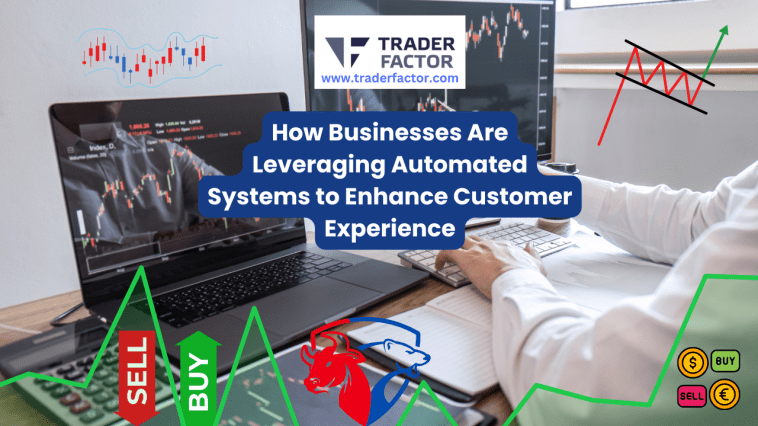In today’s fast-paced business landscape, the integration of automated systems has revolutionized the way companies interact with their customers. From streamlining processes to delivering personalized experiences, businesses across various industries are leveraging automation to enhance customer experience.
By utilizing cutting-edge technologies such as artificial intelligence, machine learning, and robotic process automation, companies can optimize efficiency, increase productivity, and provide seamless interactions that exceed customer expectations.
Let’s look at some of the best examples of system automation in the current world of business.
Enhanced Online Trading
Businesses in the finance sector, particularly forex trading platforms, have increasingly embraced automated systems to elevate the customer experience. In the realm of forex trading, automation plays a pivotal role in executing trades, managing risk, and analyzing market trends. Automated trading systems utilize algorithms to execute trades based on predefined criteria, enabling traders to capitalize on opportunities in real time without manual intervention.
Moreover, these systems provide advanced analytics and insights, empowering traders to make data-driven decisions and stay ahead in the volatile foreign exchange markets. This level of automation not only enhances the speed of trade execution but also ensures adherence to predetermined strategies, leading to improved customer satisfaction and overall trading experience.
Enhanced Customer Service
One of the key areas where businesses leverage automated systems is customer service. Through the implementation of chatbots and virtual assistants, companies can offer 24/7 support, address customer inquiries promptly, and deliver personalized assistance at scale.
Chatbots are equipped with natural language processing capabilities, allowing them to understand and respond to customer queries in a conversational manner. They can provide product information, troubleshoot common issues, and even facilitate transactions, thereby enhancing the overall customer service experience.
Moreover, automation enables businesses to analyze customer interactions, gather valuable insights, and tailor their services to meet individual needs, ultimately fostering stronger customer relationships.
Personalization and Targeted Marketing
Automated systems empower businesses to deliver highly personalized experiences to their customers. By leveraging data analytics and machine learning algorithms, companies can analyze customer behavior, preferences, and purchase history to create targeted marketing campaigns.
Automated email marketing systems, for instance, can segment customers based on their interests and past interactions, enabling businesses to send relevant and engaging content that resonates with each recipient.
Furthermore, automation facilitates the dynamic adaptation of marketing messages in real time, ensuring that customers receive timely and customized communications, ultimately leading to higher engagement and conversion rates.
Streamlined Operation Efficiency
Automation extends beyond customer-facing activities and permeates into the operational aspects of businesses. From inventory management to order processing, automated systems streamline internal processes, leading to improved efficiency and reduced turnaround times.
For instance, in e-commerce, automated inventory management systems ensure accurate stock levels, preventing stockouts and backorders, thus enhancing the overall customer experience.
Additionally, automated order processing and fulfillment systems enable businesses to expedite the delivery of products and services, resulting in satisfied customers who receive their orders promptly, contributing to positive reviews and repeat purchases.
Data-Driven Financial Analytics
The integration of automated systems empowers market brokers and traders to harness the power of data for informed decision making. Through predictive analytics and machine learning, companies can forecast market behavior, market trend analysis, and anticipate future prices.
For example, in the retail sector, automated systems can analyze historical sales data and external factors to predict demand, optimize pricing strategies, and manage inventory levels effectively. By leveraging such insights, businesses can proactively cater to customer demands, minimize stock obsolescence, and ensure a seamless shopping experience, thereby fostering long-term customer loyalty.
Enhancing Omnichannel Experiences
Customers expect a seamless experience across multiple touchpoints, whether online, in-store, or through mobile applications. Automated systems enable businesses to unify these channels and provide a consistent experience to customers.
For instance, integrated customer relationship management (CRM) systems coupled with automation can ensure that customer interactions and purchase history are readily available to all relevant departments, allowing for personalized and consistent communication.
Furthermore, automated marketing platforms can orchestrate targeted campaigns across various channels, ensuring that customers receive cohesive messaging regardless of the platform they engage with, leading to a harmonized omnichannel experience.
Self-Service Capabilities
Self-service has become an integral part of modern customer experiences, offering convenience and empowerment to customers. Automated systems enable businesses to provide robust self-service capabilities through intuitive interfaces, knowledge bases, and interactive tools.
For instance, in the telecommunications industry, automated self-service portals allow customers to manage their accounts, troubleshoot common issues, and even upgrade their services without the need for direct intervention from customer support agents.
This not only enhances efficiency and reduces operational costs but also empowers customers to resolve their queries and fulfill their needs independently, contributing to a positive customer perception of the brand.
Final Thoughts
Businesses are leveraging automated systems to transform the customer experience across various touchpoints. Whether it’s through personalized interactions, streamlined operations, or data-driven decision making, automation is driving profound changes in how companies engage and serve their customers.
As technology continues to advance, businesses will increasingly rely on automated systems to not only meet but exceed customer expectations, ultimately driving sustainable growth and competitive advantage in an ever-evolving marketplace.




